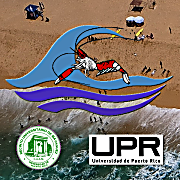PhD. PROGRAM
.
Applicants should have a B.S. or M.S. in Biology, Chemistry, Geology, Physics or Marine Science or in an appropriate related scientific discipline. Students develop a program of study in biological, chemical, geological or physical oceanography. Typical areas of research emphasis include marine biogeochemistry, coastal ecology, coastal ocean processes, microbial ecology, marine ecosystem studies, marine biotechnology, systematics, marine botany, invertebrate zoology, remote sensing, zooplankton ecology, and several other branches within the basic core areas. See potential research areas available.

The Ph.D. requires a minimum of 72 hours of graduate-level credit, of which 14 must consist of core courses in Biological Oceanography (CMOB-6618), Chemical Oceanography (CMOQ-6615), Geological Oceanography (CMOG-6616), Physical Oceanography (CMOF-6617), and (CIMA 8785) Current Topics Seminar. Additional graduate courses from Marine Sciences and other departments are available to complete each student’s program. PhD candidates will conduct independent research and submit and defend a dissertation including one published peer reviewed article and two papers submitted to recommended peer reviewed journals.
Specific Requirements for the Ph.D. Degree
In addition to the minimum Graduate School Requirements concerning student academic status and residence, the following are required:
1. A total of 72 graduate-level credits beyond the baccalaureate degree including (At least 42 of the 72 credits must be taken at the DMS):
| CREDITS | COURSES |
|---|---|
| 12 | Core courses (biological, chemical, geological and physical oceanography) approved with grades of B or better. |
| 2 | CIMA 8785 – Current Topics Seminar, approved with grades of B or better. |
| Up to 12 | CIMA-8999 Doctoral Research and Dissertation |
| 3 – 9 | Required credits for the specific core area |
| 43 | Additional graduate courses available at DMS and other departments (chosen by the student following consultation with the student’s advisor and graduate committee). Up to 30 credits may be co-validated from a previous MS degree. |
2. A written qualifying examination (based on the four core are and advanced knowledge on the student’s basic science discipline.
3. A written and oral comprehensive exam in their broad area of specialization.
4. A written dissertation based on the results of their original research including the publication of one article and the submission of two peer reviewed articles in recommended peer reviewed journals.
5. Formal oral defense of the dissertation document
6. Residence requirement is one year for candidates with a master’s degree two years for candidates with a bachelor’s degree
Recommended Time Table for Completion of the PhD Degree
| COURSES | COMPLETION BY |
|---|---|
| Core courses approved | End of 2nd semester |
| Major Advisor | Selected as part of the admission process |
| Graduate Committee | By the end of 1st semester |
| Ph.D. Qualifying Exam | End of 2nd semester (first of two opportunities) |
| Thesis proposal | End of 3rd semester |
| Ph.D. written and oral comprehensive | At completion of formal course work |
| Admission to candidacy | Upon approval of Comprehensive Exam |
| Graduation | Upon completion of above requirements to a maximum Maximum of: 8 years for applicants with an MS degree. Maximum of: 10 years for applicants with a BS degree or equivalent. |
.
NOTE: The information on this page changes frequently, may be outdated and in need of revision. Please contact us for the most up to date information, cima@uprm.edu.


